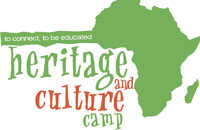Phone: 1.800.775.1797
Speakers and Instructors
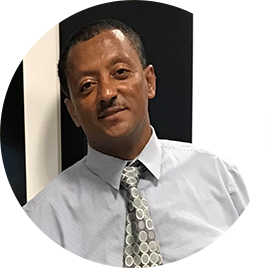
ፍቅር እስከ መቃብር (FIKIR ISKE-MEKABIR) LOVE UNTO CRYPT
SISAY AYENEW
The novel ፍቅር እስከ መቃብር (Fikir Iske-Mekabir), published in 1968 by Haddis Alemayehu, is a very well-known classic Ethiopian novel. The novel became popular in Ethiopia during the 1970/80s when it was narrated over the radio. The novel became so popular that young and old stopped what they were doing to listen. Recently, the world famous Ethiopian musician Teddy Afro released a music video based on this novel titled “Mar Eske Tuaf”, which made it even more popular and introduced the novel to this generation. This classical Ethiopian literature comes with rich cultural significance for Ethiopians, and it is greatly cherished by many. Sisay Ayenew, understanding the significance of this piece of writing, took it upon himself to translate it into English with the title Love Unto Crypt. Sisay will discuss his background as a writer, his inspirations, his thoughts on the significance of the original novel, and as well as his translation of the novel.
SISAY AYENEW was born in Addis Ababa, Ethiopia and finished high school at Shemelis Habte Secondary School. He has always loved to read and write ever since he was a young child. Sisay immigrated to the United States in 1995. Sisay has been married to his wife Tihitina for 16 years and has two children, Mayaye (9) and Theodros (6). Sisay started working on the translation of Fikir Iske-Mekabir (Love Unto Crypt) after finishing high school, while he was still in Ethiopia. Sisay finished the translation in the United States, and got the book published in 2005. He has also finished working on another book, which will be published soon.
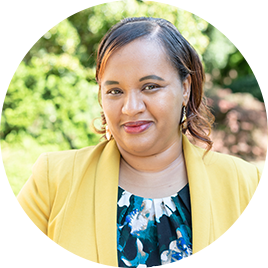
THE BEAUTY OF BEING YOUR AUTHENTIC SELF
TIBERAH BERHANU
Tiberah Berhanu’s first children’s book weaves diversity against the backdrop of a child’s imagination. She unapologetically titled her book My Uncle is an Alien. Children will listen to a reading of My Uncle is an Alien and interact with the author. She will share her experiences in the form of storytelling and will explore the importance of showing up as your true self and preserving your culture. In addition, children will be able to participate in a session on writing their own ending to the story for a chance to be included on the Author’s website, pending parent’s permission.
Recognizing that the world benefits from our unique perspectives, parents will hear first-hand from someone who came to the United States at an early age and why it is important to support children in pursuing their passion. While growing up in Jersey City, NJ, Tiberah was very concerned about “fitting in” with the kids at school. So much so that she would protest so as not to wear an Habesha kemis (Ethiopian dress) to church because she worried that if one of her friends saw her wearing the traditional outfit on the way to church, they would make fun of her. Sadly, Tiberah barely paid any attention during Amharic lessons in church and was often kicked out for being disruptive. At the center of Tiberah’s denial of her culture was a lack of not knowing where she came from. So, in 2009, after being away for 20 years, Tiberah returned to Ethiopia. During the trip, she was able to release a lot of emotions that were bottled up. At the end, Tiberah realized the depth of her culture and the beauty in “showing up as who you truly are”.
TIBERAH BERHANU was born in Addis Ababa, Ethiopia, and immigrated to the United States when she was six years old. As a newcomer, it was not easy to adapt. Learning a new culture, language, and way of life had its ups and downs. After learning how to read in English, Tiberah fell in love with books, words, and the ability to express oneself. This translated into storytelling, which is one of Tiberah’s passions. In high school Tiberah’s poem, “Time Will Transcend”, won publication during a nationwide contest. During college, she co-created a community website, www.TsehaiNY.com, and interviewed notable figures, such as the late Dr. Catherine Hamlin. Most recently, she self-published her first children’s book, My Uncle is an Alien. In 2009, Tiberah was part of the Heritage and Culture Camp’s panel on Growing-up-in-America, that was the same year she returned to Ethiopia after being away for 20 years. Tiberah received her Bachelor’s in Communications/Broadcast and her Master’s in Health Services Administration/Public Administration. She currently works for Comcast as a Director of Employee Communications. Tiberah lives in West Orange, NJ, with her husband, Daniel Tsega, and two sons – Biruk Azeze (age 9) and Yonas Azeze (age 4). To learn more about Tiberah, visit her website at www.tiberahberhanu.com and signed copies will be available for purchase.
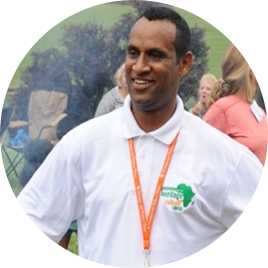
LANGUAGE CLASS FOR ALL - SING IT IN አማርኛ!
DEREJE DESTA
Our Camp has a special focus on language, as we strongly believe language is key in connecting our kids to their heritage and culture. As such, we continue to offer language classes. This year we have language sessions with a bit of a twist – Sing It In አማርኛ!
DEREJE DESTA is International Broadcaster (Multimedia) at Voice Of America (VOA), Washington DC. He was the founder and Publisher of Zethiopia, a Washington, D.C. based, bilingual (Amharic and English) newspaper where he served as Editor-at-Large for the online publication. He is a veteran journalist who has served as a television and radio host, producer, and editor for more than 26 years in the U.S. and Ethiopia. He reported and contributed to NPR’s “Latitude” show and won an award for international affairs reporting from New America Media and the American University. Dereje was a Business Development Manager; Africa and the Middle East, for AudioNow. Dereje graduated from Addis Ababa University, in 1991, with a bachelor’s degree in Ethiopian Languages and Literature. In addition, he is Amharic language consultant and offers translation services. For the last fourteen years, Dereje has also been Amharic language instructor and Ethiopian culture and etiquette teacher for Heritage & Culture Camp.
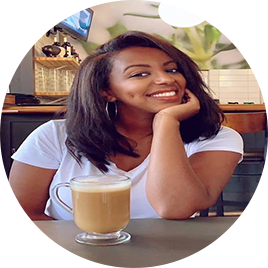
“CAUGHT BETWEEN TWO WORLDS”
FEVEN GIRMAY
As part of her graduate studies, Feven Girmay had the opportunity to conduct a series of interviews of inspiring individuals from different ethnic and cultural backgrounds. Join us for a presentation and discussion based on Feven’s findings from these interviews, as the individuals discussed their cultural experiences of growing up in a multicultural household. They shared their perspectives on multiculturalism as an idea and as a lived experience, addressed how their backgrounds impacted their life experiences, as well as their college/university life and their ideas on multicultural education. They shared experiences of what it is like to be “caught” between two different worlds, answering questions such as: What are the challenges of living in different ethnic and cultural backgrounds when growing up in a multicultural household? How did they navigate between the two worlds? How did they cope with the reality of being Caught Between Two Worlds? Puzzled and confused? Being caught between two worlds can be a blessing, but a curse if we let it. But how do we sort that out? Join us to find out and discuss more.
FEVEN GIRMAY was born in Addis Ababa, Ethiopia, and lived in Asmara, Eritrea for a few years before coming to the US at the age of 14. She recently made the transition to the DC area, but she is a Midwesterner at heart calling the state of Illinois home. Feven is a higher education professional with interests in student services, student success, and international students. Currently she works as a Program Manager at Robert H. Smith School of Business at The University of Maryland, College Park
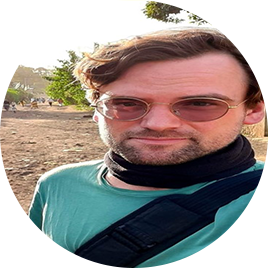
MAKING A DIFFERENCE IN RURAL ETHIOPIA
THOMAS GRYCZKA
Doctor Tom (as he is called by locals) will share about his role in the establishment of a new hospital in rural Ethiopia and how the idea of this project started. He will also talk about the health care system in Ethiopia with a unique focus on maternal health and why it is imperative to support positive maternal health outcomes. Furthermore, he will tell stories about what daily life as a foreigner is like in a small community, including perspective on customs, culture, and cuisine.
Doctor Tom will also address the kids separately sharing about his work, why he chose to move to Ethiopia, and what his daily life looks like as a doctor in a small town. He will share stories about his local skateboarding club, and what daily life looks like in Ethiopia, including local customs, culture, and cuisine.
THOMAS GRYCZKA is a German medical Doctor who moved to Butajira, Ethiopia in March 2021. After learning about a hospital project in rural Ethiopia, he decided to leave his 9-5 job in internal medicine and life in Cologne, Germany to dedicate himself to a higher purpose. Upon arriving in Ethiopia, Doctor Tom spent the first few months learning about the local health care system, visiting different hospitals and health clinics, and learning basic Amharic. Through his experience on the ground, he soon learned the importance of maternal health and the ways it impacts day to day life in local communities. He applied these learnings to the hospital project in Butajira and set the focus of the new clinic on Gynecology and Obstetrics. Furthermore, he was moved to pursue his doctoral thesis on Maternal Health in Ethiopia and continues to incorporate his medical knowledge in the governmental hospital. In Doctor Tom’s free time, you can find him in Butajira playing guitar, skateboarding with the local youth, or hiking in the mountains.
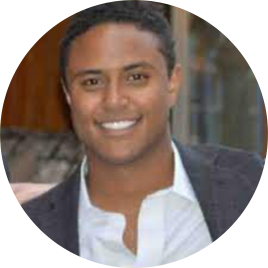
GROWING UP IN AMERICA - UPDATE!
BENYAM (BEN) JARSO
The Growing-up-in-America panel discussion has been a key part of this Camp from the start. This panel discussion is where parents get to listen to the challenges and the opportunities of growing up in America, directly from teens and young adults, exploring the challenges and the opportunities of growing up in America.
We are excited to share that some of our panelists who joined us in the early days of the Camp will be returning to give us an update. Since our theme for this year’s Camp is a “Family Reunion”, we thought that having some of our panelists from years back joining us would be a valuable feature to our program. Not only will they be giving us an update, but more importantly we will have more in-depth discussions, as the panelists are now mature adults, some even with their own children. We are thrilled to have Tiberah Berhanu (2009 panelist) and Feven Girmay (2011 panelist) along with Benyam (Ben) Jarso (2009 panelist), in the Growing-up-in-America – UPDATE! panel discussion
BENYAM (BEN) JARSO participated in our first ever Heritage and Culture Camp in 2009 as a panelist for our Growing-up-in-America program. At that time, Ben was a rising sophomore at the University of Chicago. We are happy to welcome Ben to this program so that he can give us an update and share his life journey as he forged a path towards a successful career in high tech. He will share with us the highs and lows, the struggles, and triumphs, as well as what he wants to do next. As a role model, Ben will address the older kids. We Know that both parents and young people will benefit from this conversation. Ben was born in Rochester, NY and moved to Maryland when he was 10 with his mom Meseret, along with his extended family. The DC area has a large Ethiopian community, in which Ben grew up. After graduating high school, Ben attended The University of Chicago, where he graduated with a degree in Economics. Soon after graduating from college, he moved to California’s Silicon Valley, to start his career in high tech. Currently, Ben is a Product Manager at Meta (formerly Facebook), where he has worked for the past 4.5 years. Ben works in the Ads Department, focusing on Privacy-preserving technology for Machine Learning, covering Facebook’s Measurement, Bidding, and Ad Auctions systems. Prior to joining Facebook, Ben was a Product Manager at Uber, as well as several other startups.
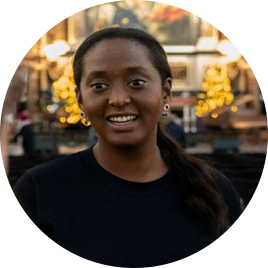
PRESERVING CULTURAL HERITAGE - ADULTS
NAOMI MEULEMANS
Naomi Meulemans was born in Jimma, Ethiopia in 1987 and was adopted in 1990 into a wonderful home in Belgium. Although a connection to Ethiopia was made early on through cultural events and family friends, it was not until 2020 that Naomi made her first return to Ethiopia. Thirty years after her departure, Naomi set foot in what very quickly became well-known grounds. In search of the familiar, she focused on her field of work – conservation and restoration of cultural heritage. Immediately, it became clear to her that Ethiopians have knowledge of their ancient cultural heritage. However, it also became clear to her that the technical understanding of preserving and sharing cultural heritage is very limited. Out of this concern and great enthusiasm, The Ethiopian Art Conservation Program (EACP) was founded. This session discusses the preserving of cultural heritage, the story of the creation of the EACP, and the Wax and Gold exhibit (see below for more details) as it relates to preserving Ethiopian Hairstyles.
PRESERVING ETHIOPIAN HAIRSTYLES – KIDS
A common challenge for Ethiopian children (and all African diaspora, in general) is the pursuit of hair care and the acceptance of hair styles perceived as deviant by others. By recognizing the ancient history and beauty in natural hairstyles, we can normalize African hair and initiate greater awareness. Ethiopian hairstyles are often more recognizable than people might imagine, but they also have much more significance than just aesthetic beauty. In 2021, the exhibition Wax and Gold, which featured various hairstyles was installed at the National Museum in Addis Ababa. After success at the National Museum, the exhibition has currently opened its doors at the Historical Museum in Jinka, Ethiopia. This session will explain the history of Ethiopian hairstyles through drawings, photographs, and artworks from this exhibition. Kids will be helped to appreciate the connection with the Western world and gradually show how a hair style can create not only a personality but also inner freedom. Using braiding techniques, children will decorate or describe each other’s hair. We explain which hair products were used historically and why preserving Ethiopian hairstyles is so important.
NAOMI MEULEMANS was born in 1987 in Jimma, Ethiopia and is a Belgian modern art curator at The Phoebus Foundation (Family Huts, Antwerp). She holds a Master’s degree from the Royal Academy of Fine Arts (2010, University of Antwerp) and specialized in Art and Economics at the University of Leuven (2012). She also specialized in Operations Management with a postgraduate degree at the University of Leuven (2017). She has worked in New York City for the Fine Arts Conservation Group (2010-2014) and continued her career in modern art in Antwerp at The Phoebus Foundation. At the Foundation, she oversees a wide variety of modern Latin American, Belgian and CoBrA art collections. In addition to art, she also has a passion for entrepreneurship and is actively engaged in connecting entrepreneurs with the art world. In 2020, she initiated the Ethiopian Art Conservation Program (EACP) which was officially launched in August 2022. EACP aims to bring art conservation education to Ethiopia with the goal of building capacity and providing specialized training to Ethiopian art conservators, to become the leading experts in Ethiopian heritage management inside and outside Ethiopia.
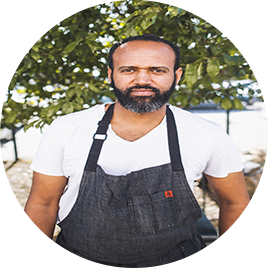
MÉLANGE: NURTURING YOUR IDENTITY THROUGH FOOD
CHEF ELIAS TADDESSE
Food is an important part of culture, which can be tied to one’s identity, and that is why we have made cooking a key aspect of our Camp. In the past, we have had several traditional cooking demos, from the basics to elaborate cooking such as making Injera and TeJ. We have also had the chance to create a Camp Cookbook. However, we have never tried to blend traditional Ethiopian cooking with American cooking!
This is why we are so excited to have Chef Elias Taddesse as our guest. Chef Elias has created a dining concept that blends traditional Ethiopian and American flavors using contemporary French cuisine techniques. Chef Elias’ extensive culinary background has allowed him to create delicious dishes that tell his stories and make memories. Chef Elias has always used food to delight people and tell stories with every ingredient.
CHEF ELIAS TADDESSE who was born in Ethiopia, raised in Minneapolis, and trained in France, is the current Owner and Executive Chef of Mélange, a newer dining concept in DC that blends traditional Ethiopian and American flavors using contemporary French cuisine techniques. After studying at the Institut Paul Bocuse in Lyon, France, Chef Elias received first-hand experience in fine dining Michelin-awarded restaurants in France and the US. Following, Elias became the Executive Chef of the Michelin-starred Caviar Russe in New York, and Chef de Partie at the two Michelin star restaurant, Corton, also in New York, under acclaimed chef Paul Leibrandt, a Master of Molecular Gastronomy. After working at many restaurants with some of the most celebrated chefs, Chef Elias knew it was time to start his own concept. He decided to take a journey back to his roots for some inspiration and headed back to Ethiopia. It was after winning a burger competition there that he found his concept. Chef Elias started his first DC pop-up upon his return to the US in 2016, followed by two additional pop-ups in the DC area. Then, in January 2017, Elias would move his pop-up to Wet Dog Tavern with the new name Mélange. After being noticed by the EDENS Catalyst program, he took the opportunity as the program’s first chef participant to launch and open his first standalone concept at City Vista in Mount Vernon Triangle in September 2020. Since opening Mélange, Chef Elias has garnered local and national recognition, including most recently being named a Finalist for the Restaurant Association of Metropolitan Washington’s Rising Culinary Star of the Year 2022 RAMMYs award and as Eater DC’s Chef of the Year 2021.
Heritage
&
Culture
REGISTER NOW!
FOLLOW US
Copyright © 2025 heritageandculturecamp.org All rights reserved. 1.800.775.1797
